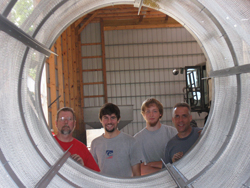
NEWS ARCHIVE
More Than Wine
Tart juice from unripened grapes and oil from seeds wooing area chefs
Finger Lakes Times - Emily McFaul
Wine is no longer the only product showcasing Finger Lakes grapes. Two new culinary products, verjuice and grape seed oil, are spicing up the regional culinary scene while keeping vineyard production sustainable.
Verjuice (also known as verjus) is made by pressing unripe grapes to make a tart liquid that can be used in place of citrus or vinegar.
Finger Lakes Food Co. founders Tina Hazlitt and the late Debra Whiting began bottling verjuice several years ago, selling it under the brand name Verjooz. Today, Hazlitt knows of only four other producers making verjuice in the United States — two in California, one in Michigan and one on Long Island.
"It's been a really slow process educating people on what it is and why they need it," said Hazlitt, who serves as Finger Lakes Food Co.'s business manager. "Now it's starting to move."
Read More: Download Article
Grape Seed Oil Production Begins
Finger Lakes Grape Seed Oil is making its debut. Years of preparation came to fruition a few days ago as we began commercial production of the area's first locally made grape seed oil at our complex in Romulus.
As the 2011 harvest proceeds for the grapes of the famous Finger Lakes wine region, we are making cold-pressed, extra virgin grape seed oil at our facility in the former Seneca Army Depot.
Our grape waste pomace processing system involves a series of four separation, screening and drying steps to remove grape seeds from the pomace and to stabilize the grape seeds for on-site storage, in preparation for our cold pressing operations. The initial separation step involves trommel screening using specialized equipment – a large trommel (see photo) that is now busy processing pomace at our complex.
Seneca BioEnergy production plans on track
ROMULUS — Seneca BioEnergy plans to begin commercial production of grapeseed oil later this month, a development three years in the making. That could be followed by production of biodiesel fuel in December. In 2008, Seneca BioEnergy purchased two warehouse buildings, with more than 40,000 square feet of space, at the former Seneca Army Depot. Private money and a Restore New York grant paid for infrastructure upgrades each of the past two years. In the past year, the company completed a series of pilot tests in biodiesel production and grape-waste processing and finished building improvements.


